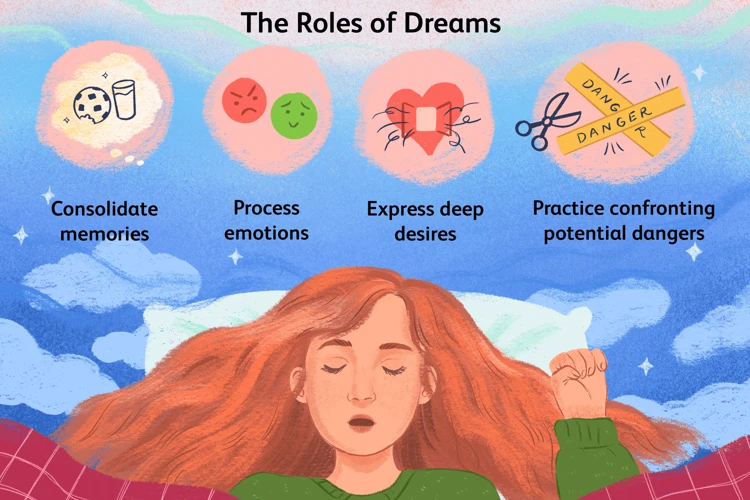The link between nutrition and hydration and our dreams is a fascinating aspect of human physiology. It’s perplexing to think that what we eat and drink can actually impact our ability to recall our dreams. But research has shown that there is indeed a connection between our diet and the vividness and frequency of our dream recollection. In this article, we will explore the importance of dream recall, how nutrition affects our ability to remember our dreams, the role of hydration in dream recall, and provide tips for optimizing dream recall through nutrition and hydration. So, let’s dive into the intriguing world of dreams and discover how what we consume can influence our dream experiences.
The Importance of Dream Recall

Dream recall plays a crucial role in understanding our subconscious mind and processing our emotions. When we dream, our brain integrates and processes information from our daily experiences, emotions, and memories. Being able to recall our dreams allows us to gain insight into our thoughts, desires, and fears. It can provide valuable clues about our mental and emotional well-being. Additionally, dream recall can assist in problem-solving and creativity as it allows us to tap into the vast potential of our unconscious mind. Various factors can hinder dream recall, such as stress /stress-dream-recall-reduction/ and certain obstacles /obstacles-to-dream-recall/. However, by understanding the importance of dream recall, we can make conscious efforts to improve our ability to remember and benefit from our dreams. Incorporating nutrition and hydration into this equation can further enhance our dream recall abilities, as we will explore in the following sections. By optimizing our nutrition and hydration, we can unlock the full potential of our dream experiences and gain deeper insight into our subconscious selves. Certain scents and essential oils /using-scents-essential-oils-dream-recall/ can be used to aid dream recall, creating a multi-faceted approach to maximizing the benefits of dream exploration.
How Nutrition Affects Dream Recall

Nutrition plays a significant role in our overall health and well-being, and it also has an impact on our ability to recall dreams. Certain nutrients and foods can support and enhance dream recall, while others may hinder it. Let’s explore how nutrition affects dream recall and what dietary choices can optimize this process.
Certain vitamins and minerals have been linked to better dream recall. Vitamin B6, for example, is known to enhance dream vividness and clarity. Foods rich in vitamin B6 include bananas, whole grains, poultry, and fish. Magnesium is another essential nutrient that can improve dream recall. It helps relax the body and mind, promoting better sleep quality and more vivid dreams. Leafy greens, nuts, seeds, and legumes are excellent sources of magnesium.
While some foods can enhance dream recall, others may have the opposite effect. It’s best to avoid consuming heavy, greasy, and spicy foods close to bedtime, as they can disrupt sleep quality and hinder dream recollection. Additionally, consuming caffeine and alcohol before bed can interfere with proper sleep patterns and reduce dream recall.
Maintaining stable blood sugar levels throughout the day can also contribute to better dream recall. Fluctuations in blood sugar can impact sleep quality and interfere with dream recollection. To stabilize blood sugar levels, it’s important to consume a balanced diet that includes a mix of complex carbohydrates, lean proteins, and healthy fats.
By paying attention to the nutrients we consume, avoiding certain foods before bed, and stabilizing our blood sugar levels, we can optimize our nutrition to support dream recall. Next, we’ll explore the role of hydration in dream recall to gain a more comprehensive understanding of how the two are interconnected.
1. Nutrients that Support Dream Recall
Certain nutrients can support and enhance dream recall, helping to improve the clarity and vividness of our dreams. Incorporating these nutrients into our diet can potentially optimize our dream experiences. Here are some key nutrients that have been linked to dream recall:
1. Vitamin B6: This vitamin is known to enhance dream lucidity and improve dream recall. Foods rich in vitamin B6 include bananas, chickpeas, salmon, chicken, and spinach.
2. Magnesium: Adequate levels of magnesium can promote better sleep quality, which in turn can enhance dream recall. Foods high in magnesium include almonds, spinach, black beans, and avocado.
3. Choline: Choline is involved in the production of acetylcholine, a neurotransmitter important for dreaming and memory. Foods rich in choline include eggs, liver, peanuts, and soybeans.
4. Tryptophan: Tryptophan is an amino acid precursor to serotonin, which plays a role in regulating sleep and mood. Foods containing tryptophan include turkey, chicken, tofu, nuts, and seeds.
5. Omega-3 fatty acids: These healthy fats are important for brain health and can potentially enhance dream recall. Foods high in omega-3 fatty acids include fatty fish like salmon, walnuts, chia seeds, and flaxseeds.
Incorporating a variety of these nutrient-rich foods into your diet can provide the necessary building blocks for optimal dream recall and overall brain function. Remember to maintain a balanced diet and consult with a healthcare professional before making any significant dietary changes.
2. Foods to Avoid Before Bed
When it comes to dream recall, the foods we consume before bed can have a significant impact on our ability to remember our dreams. Certain foods can disrupt our sleep patterns and hinder dream recall, while others can promote sound sleep and enhance our dream experiences. It’s important to be mindful of what we eat before bedtime to optimize our dream recall. One food group to avoid before bed is high-fat foods such as greasy, fried, or heavy meals. These types of foods can cause indigestion and discomfort, making it harder to fall asleep and maintain a deep sleep state where dreams occur. Similarly, spicy foods can trigger heartburn and disrupt sleep, reducing dream recall. Another category to be cautious about is caffeine and stimulants. Consuming caffeinated beverages or foods like coffee, tea, energy drinks, or chocolate before bed can interfere with sleep quality and decrease dream recall. Alcohol is another substance to avoid, as it can disrupt REM sleep, which is crucial for dream formation and recall. Additionally, foods high in sugar can cause fluctuations in blood sugar levels, leading to restless sleep and impairing dream recall. It’s best to opt for light, easily digestible snacks before bed, such as a small serving of whole grains, nuts, or a banana, which contain tryptophan and magnesium. These nutrients promote relaxation and can potentially enhance dream recall. By being mindful of our food choices before bedtime, we can create an optimal environment for vivid and memorable dreams.
3. The Role of Blood Sugar Levels
Blood sugar levels play a significant role in dream recall. When our blood sugar levels are unstable, it can impact the quality and frequency of our dreams. Here are a few key points to consider about the role of blood sugar levels:
1. Low blood sugar: If we go to bed with low blood sugar levels, it can lead to restless sleep and fragmented dreams. Our brain requires a steady supply of glucose to function optimally, and when blood sugar levels drop, it can affect our brain’s ability to create and recall dreams. To maintain stable blood sugar levels before bed, it’s important to consume a balanced meal or snack that includes a combination of complex carbohydrates, proteins, and healthy fats.
2. High blood sugar: On the other hand, high blood sugar levels can also impact dream recall. When our blood sugar is elevated, it can disrupt sleep patterns and lead to frequent awakenings throughout the night. This can result in interrupted dream cycles and hinder our ability to remember dreams. To regulate blood sugar levels, it’s important to avoid consuming high-sugar foods and drinks, especially close to bedtime.
3. The importance of timing: The timing of our meals and snacks can also affect dream recall. Consuming a heavy meal shortly before bed can cause indigestion and discomfort, making it harder to fall asleep and maintain a restful state. Similarly, consuming sugary or caffeinated foods and drinks close to bedtime can interfere with sleep quality and dream recall. It’s best to have a balanced meal or snack at least a few hours before bedtime to allow for proper digestion and stable blood sugar levels.
Maintaining stable blood sugar levels is essential for optimal dream recall. Avoiding both low and high blood sugar levels before bed and consuming a balanced diet can help promote restful sleep and improve the ability to remember dreams.
The Role of Hydration in Dream Recall

The role of hydration in dream recall is often overlooked but is just as important as nutrition. Our brains require proper hydration to function optimally, and this includes the process of dreaming. When we are dehydrated, the body conserves water by reducing the production of urine, which can lead to concentrated urine and potential disruptions in sleep. Dehydration can also affect our overall sleep quality, leading to fragmented and less restful sleep, which can impact dream recall. It’s essential to maintain a sufficient level of hydration throughout the day to support healthy sleep and dream experiences. Drinking an adequate amount of water helps ensure that our brain and body are properly nourished, allowing for clearer and more vivid dreams. Additionally, staying hydrated can also help prevent disturbances during sleep, such as waking up frequently to use the bathroom, which can interrupt dream recollection. In the next section, we will explore the best drinks for hydration and dream recollection, providing further insights on how to optimize both aspects for better dream recall.
1. Dehydration and Dream Recall
Dehydration can have a significant impact on our ability to recall our dreams. When we are dehydrated, our brain and body experience a range of negative effects, including reduced cognitive function and impaired brain activity during sleep. These effects can directly affect the clarity and vividness of our dreams, making them more difficult to remember upon waking. Dehydration can also lead to increased feelings of fatigue and grogginess, which can further hinder our ability to recall dreams. To combat this, it is crucial to stay well-hydrated throughout the day. Aim to drink an adequate amount of water, preferably 8-10 glasses, spread evenly throughout the day. Additionally, avoiding excessive consumption of caffeine and alcohol, both of which contribute to dehydration, can help maintain proper hydration levels. By prioritizing hydration, we can ensure that our bodies and minds are functioning optimally, providing a conducive environment for dream recall.
2. Best Drinks for Hydration and Dream Recollection
When it comes to hydration and dream recollection, not all drinks are created equal. While water is the obvious choice for staying hydrated, there are other beverages that can also support our dream recall abilities. Herbal teas, such as chamomile or lavender, are excellent choices before bed as they promote relaxation and help to calm the mind, setting the stage for more vivid and memorable dreams. Another good option is warm milk, which contains tryptophan, an amino acid that boosts the production of serotonin and melatonin, neurotransmitters associated with sleep and dreams. Incorporating coconut water into your daily routine can also support hydration and potentially enhance dream recall. Coconut water is rich in electrolytes, which help to replenish the body’s fluids and maintain hydration. Additionally, certain herbal elixirs or dream-enhancing teas, which can be found in specialty stores, are designed specifically to promote lucid dreaming and enhance dream recall. These beverages often contain a blend of herbs and natural compounds that have been used for centuries to stimulate dream activity. However, it’s important to note that individual experiences may vary, and it’s always best to listen to your body and choose beverages that work well for you. By selecting the best drinks for hydration and dream recollection, you can create an optimal environment for vivid and memorable dreams to unfold.
Tips for Optimizing Dream Recall Through Nutrition and Hydration

Optimizing dream recall through nutrition and hydration involves incorporating certain habits and practices into our daily routine. Here are some tips to help enhance your ability to remember your dreams:
Maintaining a balanced diet is key to overall brain health, including dream recall. Include foods rich in vitamins B6, C, and E, as they have been associated with improved dream recall. Foods like bananas, avocados, spinach, and almonds are great choices. Additionally, consuming sources of omega-3 fatty acids, such as salmon and chia seeds, may support brain function and dream recall.
Proper hydration is essential for optimal brain function, including dream recall. Drink enough water throughout the day to ensure you stay properly hydrated. Dehydration can affect the quality of your sleep, leading to potential difficulties in dream recollection.
Supplements such as vitamin B6 and melatonin have been suggested to enhance dream recall. However, be sure to consult with a healthcare professional before starting any new supplements, as they may interact with medications or have side effects.
Fluctuations in blood sugar levels can impact the quality of sleep and dream recall. Focus on consuming balanced meals that include complex carbohydrates, lean proteins, and healthy fats. Avoid sugary foods and beverages before bedtime, as they can lead to energy spikes and crashes that interfere with your sleep cycle.
Certain foods and drinks have been associated with improved dream recall. Herbal teas like chamomile or passionflower can promote relaxation and deeper sleep, enhancing dream reminiscence. Additionally, nuts, seeds, and dairy products contain tryptophan, which can potentially lead to more vivid dreams.
Creating a calming bedtime routine signals to your body and mind that it’s time to unwind and prepare for sleep. Avoid electronics and stimulating activities before bed, and instead, engage in relaxing activities such as reading, meditating, or taking a warm bath. This can improve the quality of your sleep and increase the likelihood of remembering your dreams.
By incorporating these tips into your lifestyle, you can optimize nutrition and hydration to support better dream recall. Remember, individual experiences may vary, so it’s important to find what works best for you and listen to your body’s unique needs. With a healthy approach to nutrition, hydration, and sleep hygiene, you can maximize your dream recall potential and unlock the hidden wisdom of your dreams.
1. Create a Balanced Diet
Creating a balanced diet is essential for overall health and well-being, including optimized dream recall. When it comes to dream recall, there are specific nutrients that play a vital role in supporting brain function and memory. Including these nutrients in our diet can enhance our ability to remember dreams. Here are some key nutrients to focus on:
1. Omega-3 fatty acids: Found in fatty fish like salmon, tuna, and sardines, as well as chia seeds and walnuts, omega-3 fatty acids are known for their brain-boosting properties. They can improve cognitive function and memory, which can positively impact dream recall.
2. B vitamins: B vitamins, including B6 and B12, are essential for brain health and neurotransmitter production. These vitamins can be found in foods like leafy greens, legumes, eggs, and lean meats. Adequate intake of B vitamins can promote better dream clarity and recollection.
3. Antioxidants: Antioxidants, such as vitamin C and E, help protect brain cells from damage caused by free radicals. Include colorful fruits and vegetables like berries, citrus fruits, and spinach in your diet to boost your antioxidant intake.
4. Magnesium: Magnesium has a calming effect on the nervous system and can promote deeper, more restful sleep. This mineral can be found in foods like almonds, spinach, avocados, and dark chocolate.
5. Hydration: While not a specific nutrient, staying well-hydrated is critical for brain function and dream recall. Aim to drink enough water throughout the day to maintain proper hydration.
By incorporating these key nutrients into a well-rounded diet, you can support optimal brain function and enhance your ability to recall dreams. Remember to focus on whole, nutrient-dense foods and maintain a varied diet to ensure you’re getting a wide range of beneficial nutrients.
2. Stay Hydrated Throughout the Day
Staying hydrated throughout the day is not only essential for our overall health but also plays a significant role in dream recall. Dehydration can have a negative impact on our brain function, including our ability to remember dreams. When we are dehydrated, the body conserves water by reducing urine output, resulting in concentrated urine. This can lead to increased levels of certain compounds that may affect brain function, including dream recall. Additionally, dehydration can cause fatigue, difficulty concentrating, and a general sense of discomfort, all of which can impede our ability to recall dreams. To stay adequately hydrated, it is recommended to drink water regularly throughout the day. Aim for at least eight cups (64 ounces) of water per day, and more if you engage in intense physical activity or live in a hot climate. It’s important to remember that every person’s hydration needs may vary, so listen to your body and drink when you feel thirsty. For those who struggle to drink plain water, herbal teas, infused water, or flavored beverages can be enjoyable alternatives. Drinking water consistently throughout the day can help optimize brain function and promote better dream recall.
3. Consider Supplementation
When it comes to optimizing dream recall, supplementation can be a helpful tool to consider. Certain supplements have been suggested to support brain function and enhance dream memory. Here are a few options to consider:
1. Vitamin B6: This essential vitamin is known to play a role in neurotransmitter synthesis and brain health. Some studies have suggested that taking vitamin B6 before bed can increase dream vividness and recall.
2. Melatonin: Melatonin is a hormone that regulates sleep-wake cycles. While its primary role is to help with sleep onset, some evidence suggests that taking melatonin supplements can lead to more vivid and memorable dreams.
3. Galantamine: Galantamine is a compound that has been used to improve memory and cognition. It is believed to enhance acetylcholine levels in the brain, which can lead to more vivid dreams and improved dream recall.
4. Choline: Choline is a vital nutrient for brain health, and it is involved in the production of acetylcholine, a neurotransmitter associated with memory and dreaming. Supplementing with choline may support dream recall.
It’s important to note that while these supplements may assist in dream recall, individual experiences may vary. It is always recommended to consult with a healthcare professional before starting any supplementation regimen to ensure safety and proper dosing.
4. Monitor Your Blood Sugar Levels
Monitoring your blood sugar levels is an important aspect of optimizing your dream recall. Fluctuations in blood sugar can impact the quality of your sleep and consequently, your ability to remember your dreams. When your blood sugar levels are too high or too low, it can disrupt the natural sleep cycle, leading to fragmented and less restful sleep. To maintain stable blood sugar levels, consider the following tips:
1) Eat a balanced diet that includes a mix of complex carbohydrates, protein, and healthy fats. These nutrients are digested and absorbed by the body more slowly, leading to a gradual release of glucose into the bloodstream.
2) Avoid consuming large amounts of sugary or refined foods that cause rapid spikes in blood sugar levels. These sudden spikes can disrupt your sleep and dream recall.
3) Incorporate fiber-rich foods into your diet, such as fruits, vegetables, whole grains, and legumes. Fiber helps slow down the digestion and absorption of carbohydrates, preventing sharp rises and falls in blood sugar levels.
4) Consider consuming a small, balanced snack before bed. This can help stabilize your blood sugar levels throughout the night and improve the quality of your sleep.
By keeping your blood sugar levels stable through proper nutrition, you promote a more conducive environment for deep and uninterrupted sleep, increasing the chances of vivid and memorable dreams.
5. Foods and Drinks to Consume Before Bed
When it comes to optimizing dream recall, the foods and drinks we consume before bed can make a significant difference. Certain choices can enhance brain function, promote relaxation, and improve sleep quality, thereby increasing the chances of vivid and memorable dreams. Incorporating these specific foods and drinks into your evening routine can have a positive impact on your dream recall.
1. Chamomile Tea: Chamomile tea is known for its calming properties, which can help relax the mind and prepare it for a restful sleep. It may also enhance dream recall due to its potential to improve sleep quality.
2. Turkey: Turkey contains the amino acid tryptophan, which can promote the production of serotonin and melatonin, important neurotransmitters involved in sleep regulation. Including a small portion of turkey before bed may contribute to a more restful sleep and potentially enhance dream recall.
3. Milk: Warm milk has been a popular bedtime drink for centuries and for good reason. It contains tryptophan, calcium, and magnesium, all of which promote relaxation and improve sleep quality. Drinking a small glass of warm milk before bed can potentially enhance dream recall.
4. Bananas: Bananas are a great source of potassium and magnesium, which can help relax muscles and promote deeper sleep. Additionally, they contain vitamin B6, which is known to enhance dream vividness and recall. Eating a banana before bed may contribute to more memorable dreams.
5. Almonds: Almonds are rich in magnesium, which can promote the production of serotonin and melatonin, regulating sleep patterns. Consuming a handful of almonds before bed may improve sleep quality and potentially enhance dream recall.
Remember, everyone’s tolerance and reaction to foods and drinks can vary. It’s important to listen to your own body and experiment with different options to find what works best for you in terms of promoting restful sleep and enhancing dream recall.
6. Establish a Bedtime Routine
Establishing a consistent bedtime routine is not only beneficial for overall sleep quality but can also contribute to improved dream recall. A bedtime routine helps signal to the body and mind that it is time to unwind and prepare for sleep, promoting a more relaxed and restful state. Here are some steps to consider when establishing a bedtime routine to optimize dream recall:
1. Set a consistent sleep schedule: Go to bed and wake up at the same time every day, even on weekends. This helps regulate the body’s internal clock and promotes a more predictable sleep pattern.
2. Create a relaxing pre-sleep routine: Engage in activities that promote relaxation and reduce stress before bed. This can include practices such as reading a book, taking a warm bath, listening to calming music, or practicing meditation or deep breathing exercises.
3. Limit exposure to electronic devices: The blue light emitted by electronic devices can interfere with the body’s natural sleep-wake cycle. Avoid using smartphones, tablets, or computers at least an hour before bed to allow the brain to transition into a more sleep-friendly state.
4. Create a comfortable sleep environment: Ensure that your bedroom is dark, quiet, and at a comfortable temperature. Use blackout curtains, earplugs, or white noise machines if necessary to minimize any disruptions that could interfere with sleep and dream recall.
5. Keep a dream journal: Keep a notebook and pen by your bedside to record your dreams as soon as you wake up. Write down any details or emotions you remember, even if they seem fragmented or incomplete. This practice helps train the brain to prioritize dream recall and can improve your ability to remember dreams over time.
By incorporating these steps into your bedtime routine, you can create an environment conducive to optimal dream recall. Remember, consistency is key when establishing a routine. Stick to it diligently, and over time you may notice an improvement in your dream recall abilities.
The Mind-Body Connection in Dream Recall
The mind-body connection plays a significant role in dream recall. Our physical and mental well-being can directly impact our ability to remember our dreams. Stress, anxiety, and a lack of relaxation can all contribute to a decline in dream recall. When we are stressed, our body releases cortisol, also known as the stress hormone, which can interfere with the quality and quantity of our dreams. It can cause fragmented or incomplete dream recall, making it difficult to piece together the narrative of our dreams. Additionally, an overactive mind can prevent us from entering the deep stages of sleep where most vivid dreams occur. Managing stress and promoting relaxation are crucial for enhancing dream recall. Practices such as meditation, deep breathing exercises, and engaging in activities that promote relaxation, like taking warm baths or listening to calming music, can help create the optimal mental and physical environment for dream recall. By nurturing the mind-body connection, we can increase the chances of recalling our dreams and accessing the profound insights and messages they hold.
Conclusion
In conclusion, nurturing our nutrition and hydration can greatly impact our dream recall abilities. By consuming a balanced diet and staying hydrated throughout the day, we provide our bodies with the necessary nutrients and hydration to support optimal brain function, including the intricate processes involved in dream formation and recall. Monitoring our blood sugar levels is also important, as imbalances can affect the quality of our dreams. Additionally, incorporating specific foods and drinks before bed, such as those rich in tryptophan or herbal teas, can enhance our dream experiences. Establishing a bedtime routine and practicing good sleep hygiene can further improve dream recall by creating a conducive environment for restful sleep and dream recollection. Finally, considering supplementation and exploring the mind-body connection can complement our efforts to maximize dream recall. By paying attention to our nutrition and hydration, we unlock the potential to delve into the depths of our subconscious and utilize our dreams as valuable tools for self-discovery, problem-solving, and creativity. So, let’s nourish our bodies and minds, and embark on a journey of enhanced dream recall and exploration.
Frequently Asked Questions
1. Can what I eat or drink actually affect my ability to recall dreams?
Yes, research suggests that nutrition and hydration can have an impact on dream recall. Certain nutrients and hydration levels play a role in brain function and memory, which in turn can influence the clarity and frequency of dream recollection.
2. Are there specific foods or nutrients that support dream recall?
Yes, some nutrients that are believed to support dream recall include vitamin B6, choline, and magnesium. These nutrients are found in foods like bananas, leafy greens, nuts, and whole grains.
3. Can eating certain foods before bed affect dream recall?
Absolutely. Foods that are heavy, spicy, or high in fat can disrupt sleep and may negatively impact dream recall. It’s best to avoid consuming these types of foods close to bedtime.
4. How does blood sugar level affect dream recall?
Stable blood sugar levels can promote restful sleep, including the REM (rapid eye movement) phase where dreams occur. Maintaining stable blood sugar levels through balanced meals and snacks can potentially improve dream recall.
5. Does dehydration affect dream recall?
Yes, dehydration can lead to poor sleep quality, which may decrease dream recall. It’s important to stay hydrated throughout the day to ensure optimal brain function and promote restful sleep.
6. What are the best drinks for hydration and dream recollection?
Water is the best choice for hydration, as it does not contain any added sugars or caffeine that can interfere with sleep. Herbal teas, specifically those with calming properties like chamomile or lavender, can also promote relaxation and potentially enhance dream recall.
7. How can I create a balanced diet to optimize dream recall?
Eat a variety of nutrient-dense foods, including fruits, vegetables, lean proteins, and whole grains. Incorporate foods rich in vitamin B6, choline, and magnesium to support brain function and dream recall.
8. Should I consider supplementation for better dream recall?
Supplementation should be approached with caution and under the guidance of a healthcare professional. However, specific supplements like vitamin B6 and magnesium may potentially aid in dream recall.
9. Are there specific foods or drinks I should consume before bed to enhance dream recall?
Certain foods and drinks, such as a small serving of turkey, warm milk, or herbal teas, can promote relaxation and potentially enhance dream recall. However, it’s important to avoid heavy meals or caffeine which can disrupt sleep.
10. Can establishing a bedtime routine improve dream recall?
Yes, establishing a consistent bedtime routine that includes relaxation techniques like reading, journaling, or meditation can promote better sleep quality and potentially improve dream recall. It signals to your brain that it’s time to unwind and prepares you for a deeper sleep cycle.








